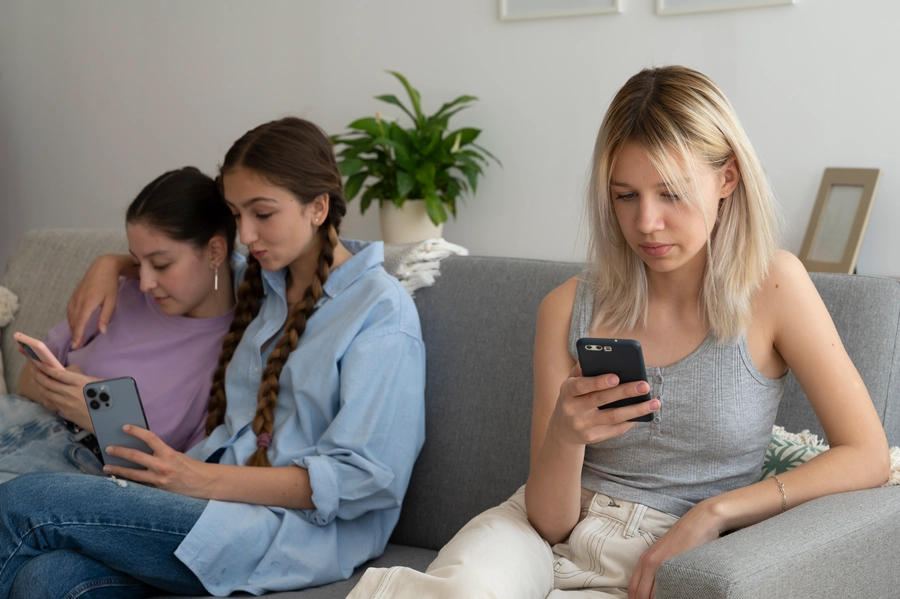- Mumbai, New Delhi, Bangalore
- (+91) 81518 30000
- WhatsApp Now
- contact@vedawellnessworld.com
In the digital age, social media has become an integral part of daily life, especially among young individuals. While these platforms offer opportunities for connection and self-expression, concerns have emerged regarding their impact on youth mental health. This blog explores how social media usage influences the mental well-being of young people, focusing on issues such as anxiety, depression, and self-esteem.
Adolescents and young adults are among the most active users of social media. A 2024 survey revealed that nearly half of U.S. teenagers reported being online almost constantly, a significant increase from 24% a decade earlier. This pervasive engagement underscores the importance of understanding the potential mental health implications associated with social media use.
Numerous studies have identified a correlation between heavy social media use and increased risks of anxiety and depression among adolescents. For instance, a systematic review found that the use of social networking sites is associated with heightened levels of psychological distress. Additionally, children and adolescents who spend more than three hours daily on social media face double the risk of experiencing symptoms of depression and anxiety.
The mechanisms behind these associations are multifaceted. Social media can contribute to feelings of inadequacy and fear of missing out (FOMO), as users are frequently exposed to curated portrayals of others’ lives. This constant comparison can exacerbate feelings of anxiety and lead to depressive symptoms.
Social media platforms often emphasize visual content, which can significantly impact users’ self-esteem and body image. Adolescents, particularly teenage girls, may compare themselves to idealized images presented online, leading to negative self-perception. A report indicated that 46% of adolescents aged 13-17 felt that social media made them feel worse about their body image.
Conversely, positive feedback on social media, such as likes and comments, can temporarily boost self-esteem. However, reliance on external validation can make self-worth contingent on online interactions, potentially leading to emotional instability when such validation is lacking.
Excessive screen time, particularly before bedtime, can disrupt sleep patterns, leading to poorer sleep quality and reduced duration. Research indicates that using mobile devices before bed diminishes sleepiness and increases alertness, resulting in an average loss of 48 minutes of sleep per week. Sleep deprivation is closely linked to difficulties in concentration, memory retention, and overall academic performance.
The anonymity afforded by social media can sometimes lead to cyberbullying, which has severe repercussions for youth mental health. Victims of cyberbullying are at a heightened risk of experiencing anxiety, depression, and suicidal ideation. A systematic review revealed that depression is three times more common among victims of cyberbullying compared to their peers.
While social media poses certain risks, it also offers opportunities for positive engagement. To mitigate adverse effects, young individuals can adopt the following strategies:
Parents and educators play a pivotal role in guiding youth toward healthy social media habits. Open dialogues about the realities of social media, including discussions on authenticity and the curated nature of online content, can help adolescents navigate these platforms more critically. Additionally, setting clear guidelines and encouraging offline activities can promote a balanced lifestyle.
Social media is a double-edged sword for today’s youth, offering both opportunities for connection and potential risks to mental health. By understanding the implications of social media use and implementing strategies to mitigate its negative effects, young individuals can harness the benefits of these platforms while safeguarding their mental well-being.
FAQs on Impact of Social Media
Social media can lead to anxiety by fostering constant comparisons, exposing users to cyberbullying, and creating pressure to maintain an idealized online presence.
Yes, reducing time spent on social media can decrease exposure to negative content and comparisons, potentially alleviating symptoms of depression and anxiety.
Indicators include increased irritability, withdrawal from offline activities, changes in sleep patterns, and a decline in academic performance.
Parents can encourage open communication, set usage boundaries, educate about online safety, and promote engagement in offline activities.
Yes, when used appropriately, social media can facilitate social connections, provide educational resources, and offer platforms for self-expression and creativity.
